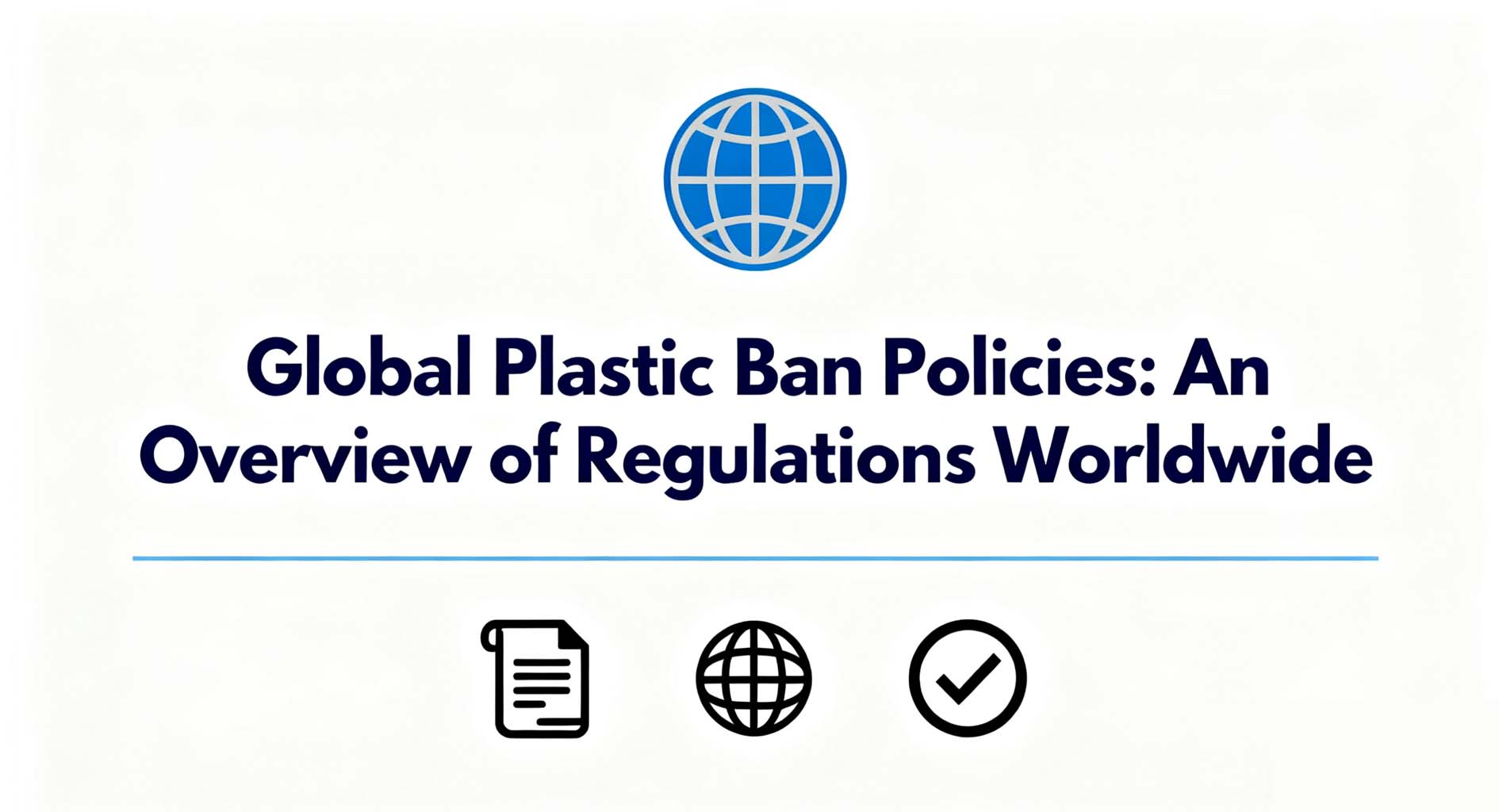Introduction
Plastic pollution has emerged as one of the most pressing environmental challenges of the 21st century. Landfills overflowing with plastic waste, microplastics contaminating oceans, and adverse effects on wildlife and human health have intensified the global urgency to reduce single-use plastics (SUPs). Governments worldwide are responding with a wide array of regulations designed to restrict or eliminate certain plastic items, encourage recycling, and promote the adoption of sustainable alternatives.
This article provides a comprehensive overview of global plastic ban policies, exploring regional approaches, enforcement mechanisms, and the implications for industries, particularly the foodservice sector. By understanding these regulations, businesses and policymakers can better navigate the shifting landscape of plastic consumption and develop strategies for compliance and sustainability.

Europe
Europe has been at the forefront of regulating single-use plastics.
European Union
The Single-Use Plastics Directive (SUPD), enacted in 2019, is a landmark EU legislation targeting plastic pollution. It prohibits a range of commonly littered items, including plastic cutlery, plates, cotton swabs, and polystyrene containers. Beyond bans, the directive requires member states to:
-
Achieve a 90% collection rate for plastic bottles by 2029.
-
Ensure that certain plastic products incorporate minimum recycled content.
These requirements reflect a dual strategy: reduce plastic use and create a circular economy where materials are reused rather than discarded.
Country-Specific Measures
-
France: Implemented a ban on plastic packaging for fruits and vegetables under 1.5 kg by 2022. French supermarkets and retailers have shifted toward biodegradable and compostable materials, creating strong demand for alternatives.
-
Germany: Emphasizes extended producer responsibility, requiring manufacturers to ensure recyclability or compostability of packaging. Incentives and fines encourage compliance, fostering innovation in eco-friendly tableware and packaging.
The combination of strict legislation and enforcement has accelerated the adoption of biodegradable alternatives, positioning Europe as a global leader in sustainable packaging.
North America
North America presents a diverse and sometimes fragmented regulatory environment.
Canada
In 2022, Canada announced a nationwide ban on six categories of single-use plastics, including checkout bags, cutlery, straws, and foodservice containers that are difficult to recycle. The legislation also introduces import and export restrictions on banned plastics, signaling a strong commitment to reducing plastic consumption and encouraging domestic production of sustainable alternatives.
United States
While federal regulation remains limited, individual states and municipalities are pioneering plastic bans:
-
California, New York, Vermont: Restrict or ban single-use plastic bags and straws.
-
Seattle and Portland: Mandate the use of compostable alternatives for foodservice packaging.
This patchwork system creates challenges for companies operating across multiple states but also opens market opportunities for suppliers of certified biodegradable materials, as local businesses strive to remain compliant.
Asia
Asia represents both a major consumer and producer of plastics, making regulatory changes particularly impactful.
China
China launched “Plastic Restriction 2.0” in 2020, banning non-biodegradable plastic bags in major cities and phasing out single-use plastic tableware nationwide by 2025. Given China’s central role in global manufacturing, this policy affects international supply chains, compelling companies worldwide to source sustainable alternatives and adapt to evolving regulatory requirements.
India
India introduced a comprehensive ban in July 2022 on single-use plastics including straws, cutlery, plates, and packaging films. While enforcement varies between urban and rural areas, the regulation signals a clear national commitment to reducing plastic waste and encouraging biodegradable alternatives.
Japan
Japan’s Plastic Resource Circulation Act encourages companies to reduce plastic use, improve recycling, and adopt biodegradable packaging materials. Convenience store chains and foodservice outlets have increasingly adopted PLA and bagasse packaging, aligning with consumer expectations and government guidelines.
Middle East and Africa
Countries in Africa and the Middle East have implemented strict plastic bans, often with severe enforcement mechanisms.
Africa
-
Kenya: Introduced one of the world’s toughest bans in 2017, including heavy fines and even jail terms for violators.
-
Rwanda: Banned plastic bags in 2008, creating a model for environmental enforcement in developing nations.
Middle East
-
United Arab Emirates (UAE) and Saudi Arabia: Phasing out single-use plastics, with Dubai announcing a full ban on plastic bags by 2024. These measures are part of broader sustainability strategies tied to tourism, urban development, and international climate commitments.
Latin America
Latin America is gradually strengthening its plastic regulations:
-
Chile: First country in South America to ban plastic bags nationwide.
-
Mexico City: Prohibits plastic straws, cutlery, and containers.
-
Colombia and other nations: Implement similar policies to reduce plastic waste.
Urban areas with a growing foodservice and retail sector provide fertile ground for biodegradable alternatives, as companies strive to comply with local regulations.
Global Impacts and Industry Implications
The cumulative effect of these regulations is significant:
-
Behavioral Shifts: Consumers are increasingly aware of plastic pollution and prefer businesses using eco-friendly packaging.
-
Operational Adjustments: Companies must redesign supply chains, source compliant materials, and maintain documentation for regulatory audits.
-
Market Opportunities: Manufacturers of biodegradable tableware, including cups, plates, containers, and cutlery, are seeing unprecedented demand.
-
Regulatory Complexity: Diverse regional policies require flexible product certifications, labeling, and disposal guidance.
Businesses operating globally must remain informed of evolving regulations to ensure compliance and to capitalize on the growing market for sustainable alternatives.
Conclusion
The global movement to restrict single-use plastics demonstrates an unambiguous shift toward environmental responsibility. From the stringent EU SUP Directive to Asia’s phased bans and Africa’s rigorous enforcement, governments worldwide are actively curbing plastic consumption. For businesses, these policies present challenges but also significant opportunities to innovate and adopt biodegradable alternatives. Understanding the regulatory landscape is essential for manufacturers, retailers, and foodservice providers seeking to navigate compliance, meet consumer expectations, and contribute to a sustainable future.
FAQ
1. What are single-use plastics (SUPs)?
Single-use plastics are items designed to be used once and discarded, such as straws, cutlery, bags, and food containers.
2. Which countries have implemented strict plastic bans?
Countries with strict bans include EU member states, China, India, Kenya, Rwanda, UAE, Saudi Arabia, Chile, and Mexico.
3. What items are typically banned under global plastic regulations?
Commonly banned items include plastic cutlery, plates, straws, bags, polystyrene containers, and certain foodservice packaging.
4. What is the EU Single-Use Plastics Directive (SUPD)?
The SUPD, enacted in 2019, bans specific single-use plastics and mandates collection and recycled content requirements to reduce plastic pollution.
5. How do plastic bans impact businesses?
Businesses must redesign packaging, source compliant materials, maintain certification, and comply with regional regulations, while opportunities exist in biodegradable alternatives.
6. Are biodegradable alternatives accepted under these bans?
Yes, compostable and biodegradable packaging is encouraged as a sustainable alternative, provided it meets relevant standards and regulations.
7. Do regulations vary by region?
Yes, regulations differ across continents and countries. Businesses must adapt to local policies for compliance.
References
-
Global Plastic Ban Policies
👉 : InNaturePack -
A Global Map of Single-Use Plastic Regulations
👉 : ukhi.org -
Plastic Bans Around the World
👉: Solinatra -
5 Countries on 5 Continents Doing Plastic Policy Right
👉 : Earth Day
Copyright Statement
© 2025 Dashan Packing. All rights reserved.
This article is an original work created by the Dashan Packing editorial team.
All text, data, and images are the result of our independent research, industry experience,
and product development insights. Reproduction or redistribution of any part of this content
without written permission is strictly prohibited.
Dashan Packing is committed to providing accurate, evidence-based information and
to upholding transparency, originality, and compliance with global intellectual property standards.





